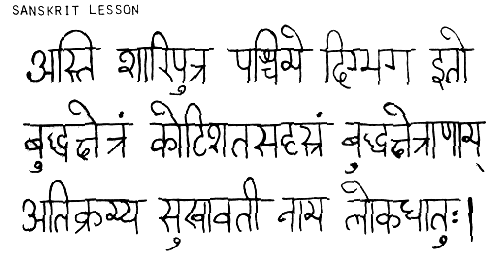
asti sariputra pascime digbhaga ito
buddhaksetram kotisatasahasram
buddhaksetranam
atikramya sukhavati nama lokadhatuh.
"There is, Sariputra, in the direction west from here a Buddhaland-- when one has traveled over hundreds and thousands of kotis of Buddhalands--the World of Happiness by name."
(continued from issue 72) by Bhikshuni Heng Hsien
"There is" (asti, third person singular, present active indicative of the root as-"be"), says Sakyamuni Buddha, continuing to address his disciple "Sariputra" (sariputra, masculine, singular, vocative), "in the direction" (digbhage; digbhage in our text because the final-e of the locative singular is weakened before the initial i- of ito) "west" (pascime, locative singular, masculine, agreeing with digbhage) "from here" (itas; ito in this context because final -as regularly becomes -o when the following word begins with a voiced sound) "a Buddhaland" (buddhaksetram, neuter singular nominative, subject of asti)-- "when one has traveled over" (atikramya; the prefix ati means "over" in the sense of "beyond;" the root kram- means "stride" or "go," hence "travel," and the suffix -ya indicates that atikramya is a gerund) "a hundred" (sata) "thousand" (sahasram, accusative singular neuter, direct object of atkramya) "kotis" (koti; a koti is a very high number. Here koti-sata-sahara is a compound, literally "a koti-hundred-thousand.") "of Buddhalands (buddhaksetranam, genitive plural neuter; ksetra very literally means "field") "the world" (lokadhatuh, masculine singular, predicate nominative describing buddhaksetram) "of Happiness" (sukhavati, feminine singular, predicate nominative describing lokadhatuh) "by name" (nama, adverbial accusative of the neuter noun naman "name"). The Buddha is telling his disciple Sariputra that, located west from where we are, over a hundred-thousand kotis of Buddhalands away, there is a Buddhaland, a world, called the Land of Happiness.